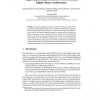Free Online Productivity Tools
i2Speak
i2Symbol
i2OCR
iTex2Img
iWeb2Print
iWeb2Shot
i2Type
iPdf2Split
iPdf2Merge
i2Bopomofo
i2Arabic
i2Style
i2Image
i2PDF
iLatex2Rtf
Sci2ools
106
click to vote
DELOS
2004
2004
Supporting Information Access in Next Generation Digital Library Architectures
Current developments on Service-oriented Architectures, Peer-to-Peer and Grid computing promise more open and flexible architectures for digital libraries. They will open DL technology to a wider clientele, allow faster adaptability and enable the usage of federative models on content and service provision. These technologies rise new challenges for the realization of DL functionalities, which are rooted in the increased heterogeneity of content, services and metadata, in the higher degree of distribution and dynamics, as well as in the omission of a central control instance. This paper discusses these opportunities and challenges for three central types of DL functionality revolving around information access: metadata management, retrieval functionality, and personalization services.
Related Content
| Added | 30 Oct 2010 |
| Updated | 30 Oct 2010 |
| Type | Conference |
| Year | 2004 |
| Where | DELOS |
| Authors | Ingo Frommholz, Predrag Knezevic, Bhaskar Mehta, Claudia Niederée, Thomas Risse, Ulrich Thiel |
Comments (0)

